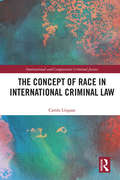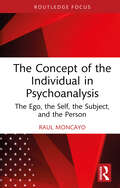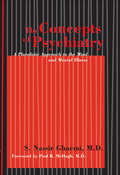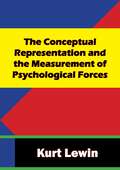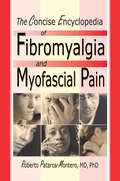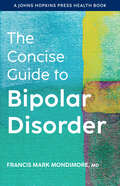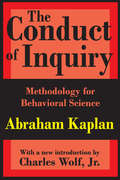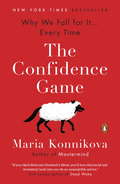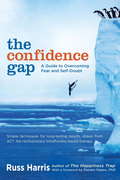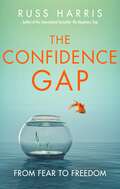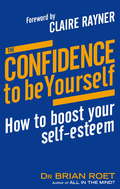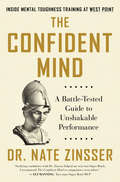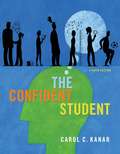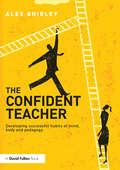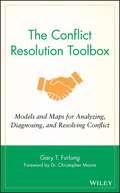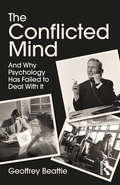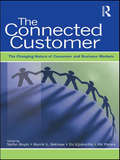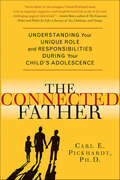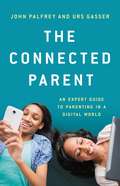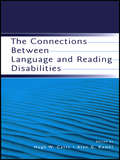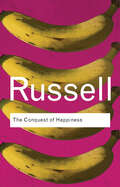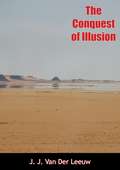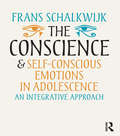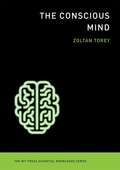- Table View
- List View
The Concept of Race in International Criminal Law (International and Comparative Criminal Justice)
by Carola LingaasMembers of racial groups are protected under international law against genocide, persecution, and apartheid. But what is race – and why was this contentious term not discussed when drafting the Statute of the International Criminal Court? Although the law uses this term, is it legitimate to talk about race today, let alone convict anyone for committing a crime against a racial group? This book is the first comprehensive study of the concept of race in international criminal law. It explores the theoretical underpinnings for the crimes of genocide, apartheid, and persecution, and analyses all the relevant legal instruments, case law, and scholarship. It exposes how the international criminal tribunals have largely circumvented the topic of race, and how incoherent jurisprudence has resulted in inconsistent protection. The book provides important new interpretations of a problematic concept by subjecting it to a multifaceted and interdisciplinary analysis. The study argues that race in international criminal law should be constructed according to the perpetrator's perception of the victims’ ostensible racial otherness. The perpetrator’s imagination as manifested through his behaviour defines the victims’ racial group membership. It will be of interest to students and practitioners of international criminal law, as well as those studying genocide, apartheid, and race in domestic and international law.
The Concept of the Individual in Psychoanalysis: The Ego, the Self, the Subject, and the Person (Routledge Focus on Mental Health)
by Raul MoncayoThe Concept of the Individual in Psychoanalysis considers the different conceptions of the individual that are found in psychoanalysis according to the culture in which it operates, and its political structure.Considering the origins and use of concepts including the Ego, the Self, the Subject, and the Person, Raul Moncayo integrates Lacanian analysis with Freudian and Jungian theory, philosophy, and religion. Moncayo expands on the concepts in different cultures and political structures, including English, French, German, and Chinese. The book also considers the concept of the self as used by Winnicott, Kohut, and Lacan.The Concept of the Individual in Psychoanalysis will be of great interest to psychoanalysts in practice and in training, and to academics and students of Lacanian and psychoanalytic studies.
The Concepts of Psychiatry: A Pluralistic Approach to the Mind and Mental Illness
by S. Nassir GhaemiBecause most psychiatric illnesses are complex phenomena, no single method or approach is sufficient to explain them or the experiences of persons who suffer from them. In The Concepts of Psychiatry S. Nassir Ghaemi, M.D. argues that the discipline of psychiatry can therefore be understood best from a pluralistic perspective. Grounding his approach in the works of Paul McHugh, Phillip Slavney, Leston Havens, and others, Ghaemi incorporates a more explicitly philosophical discussion of the strengths of a pluralistic model and the weaknesses of other approaches, such as biological or psychoanalytic theories, the biopsychosocial model, or eclecticism.Ghaemi's methodology is twofold: on the one hand, he applies philosophical ideas, such as utilitarian versus duty-based ethical models, to psychiatric practice. On the other hand, he subjects clinical psychiatric phenomena, such as psychosis or the Kraepelin nosology, to a conceptual analysis that is philosophically informed. This book will be of interest to professionals and students in psychiatry, as well as psychologists, social workers, philosophers, and general readers who are interested in understanding the field of psychiatry and its practices at a conceptual level.
The Conceptual Representation and the Measurement of Psychological Forces
by Kurt LewinKurt Lewin (1890-1947) was a German-American psychologist, known as one of the modern pioneers of social, organizational, and applied psychology. Lewin is often recognized as the "founder of social psychology" and was one of the first to study group dynamics and organizational development. Lewin developed the concept of force field analysis, which provides a framework for looking at the factors (forces) that influence a situation, originally social situations. It looks at forces that are either driving movement toward a goal (helping forces) or blocking movement toward a goal (hindering forces). The principle, developed by Kurt Lewin, is a significant contribution to the fields of social science, psychology, social psychology, organizational development, process management, and change management. This book is an early effort to establish the principles of his force field analysis. An attempt is made to describe the position of the concept of force in psychology and to discuss major methods of measuring psychological forces. One of the outstanding properties of force is its directedness. Direction in psychology cannot be defined as physical direction and cannot be determined by Euclidian geometry. A geometry applicable in psychology is that of hodological space. The geometrical properties of this space are described, and examples of its application in determining directions and distances in the life space are offered...Various methods of measuring forces and valences are surveyed, especially those related to opposing forces and to velocity of locomotion, including velocity and restlessness, consumption, translocation, and learning. The problem of the structure of the force field and of overlapping force fields is discussed, including several choice and conflict situations with stable and labile equilibria.-Print ed.
The Concise Encyclopedia of Fibromyalgia and Myofascial Pain
by Roberto Patarca MonteroAn A-to-Z look at these crippling disorders!Compiled by one of the foremost researchers in the field of immunology, The Concise Encyclopedia of Fibromyalgia and Myofascial Pain is an A-to-Z summary of current knowledge that updates patients and health care professionals on these disabling clinical disorders. This vital information has been organized in an easy-to-use format that lets you become familiar with highlights of the most relevant topics.The Concise Encyclopedia of Fibromyalgia and Myofascial Pain gives you immediate access to the latest advances in rheumatology, cardiovascular medicine, endocrinology, epidemiology, immunology, infectious diseases, neurology, psychiatry, and psychology that form the basis for new lines of research and therapeutic intervention. This comprehensive reference summarizes information published mainly in the last decade, providing a thoughtful and balanced resource that will educate and increase awareness of these often-misdiagnosed disorders.The Concise Encyclopedia of Fibromyalgia and Myofascial Pain allows easy access to: relevant case study findings, summarized to provide the answers you need evidence-based alternative medicine approaches pertinent findings on related disorders an extensive bibliography Comprehensive and thorough, The Concise Encyclopedia of Fibromyalgia and Myofascial Pain gives you the information you’ve been looking for on these painful disorders that affect more than six million Americans. This important book gives health care professionals a greater understanding and awareness of fibromyalgia and myofascial pain and gives patients help at their fingertips.
The Concise Guide to Bipolar Disorder (A Johns Hopkins Press Health Book)
by Francis Mark MondimoreA concise, essential guide to living with bipolar disorder by an internationally known expert.When a diagnosis of bipolar disorder enters your life, you may not be sure where to turn for accurate information about this potentially devastating but treatable illness. Whether you yourself have been diagnosed, or a spouse, parent, child, friend, or employee has developed the illness, the need for information and advice is acute. Presenting the essentials of diagnosis and treatment clearly and succinctly, leading psychiatrist Dr. Francis Mark Mondimore distills everything you need to know about bipolar disorder in this new indispensable guide. In down-to-earth language, Dr. Mondimore explains what bipolar disorder is and how you (or your loved one) can live your best life with the help of medications, therapy, the support of family and friends, and medical care. An extensive list of references is included, along with additional suggested reading materials and online resources. Realistic clinical descriptions and anecdotes reflecting on fascinating historical details associated with this condition provide further information. The Concise Guide to Bipolar Disorder is an excellent up-to-date resource for the newly diagnosed or those seeking rapid answers to the most common questions about bipolar disorder.Past Praise for Books by Francis Mark Mondimore, MD"Offers advice on how to live with bipolar disorder, and how not to become its victim."—Large Print Reviews"An enlightened, pragmatic, and empathic resource for this very complex and challenging illness."—Journal of Clinical Psychiatry"An absolute gold mine for those with the disorder and their families: thorough, candid, and up-to-date advice, full of new possibilities for help."—Kirkus Reviews
The Conduct of Inquiry: Methodology for Behavioural Science
by Abraham KaplanIn arguably the finest text ever written in the philosophy of social science, Abraham Kaplan emphasizes what unites the behavioral sciences more than what distinguishes them from one another. Kaplan avoids the bitter disputes among people doing methodology, claiming instead that what is important are those qualities intrinsic to the overall aspirations of the social sciences. He deals with special problems of various disciplines only so far as may be helpful in clarifying the general method of inquiry.The Conduct of Inquiry is a systematic, rounded, and wide-ranging inquiry into behavioral science. Kaplan is guided by the experience of sciences with longer histories, but he is bound neither to their problems nor to their solutions. Instead, he addresses the methodology of behavioral science in the broad sense of both method and science. The work is not a formal exercise in the philosophy of science but rather a critical and constructive assessment of the developing standards and strategies of contemporary social inquiry. He emphasizes the tasks, achievements, limitations, and dilemmas of the newer disciplines.Philosophers of science usually choose to write about the most fully developed sciences because problems are clearer there. The result is ordinarily of little benefit to the behavioral scientist, whose task is clarification of method; here the precedents and analogies of physical science are obscure or inappropriate. The Conduct of Inquiry goes a long way in drawing upon the strengths of social research insights without simplifying the common concerns of the scientific enterprise as a whole. As Leonard Broom noted when the book initially appeared: "Kaplan fills a gap and does so with admirable clarity and often engaging wit. It lacks pomposity, pedantry, and pretension, and it is bound to make an impact on the teaching of and, with luck, research in the behavioral sciences."
The Confidence Game: Why We Fall for It . . . Every Time
by Maria Konnikova"It’s a startling and disconcerting read that should make you think twice every time a friend of a friend offers you the opportunity of a lifetime.”—Erik Larson, #1 New York Times bestselling author of Dead Wake and bestselling author of Devil in the White CityThink you can’t get conned? Think again. The New York Times bestselling author of Mastermind: How to Think Like Sherlock Holmes explains how to spot the con before they spot you.“[An] excellent study of Con Artists, stories & the human need to believe” –Neil Gaiman, via Twitter A compelling investigation into the minds, motives, and methods of con artists—and the people who fall for their cons over and over again. While cheats and swindlers may be a dime a dozen, true conmen—the Bernie Madoffs, the Jim Bakkers, the Lance Armstrongs—are elegant, outsized personalities, artists of persuasion and exploiters of trust. How do they do it? Why are they successful? And what keeps us falling for it, over and over again? These are the questions that journalist and psychologist Maria Konnikova tackles in her mesmerizing new book. From multimillion-dollar Ponzi schemes to small-time frauds, Konnikova pulls together a selection of fascinating stories to demonstrate what all cons share in common, drawing on scientific, dramatic, and psychological perspectives. Insightful and gripping, the book brings readers into the world of the con, examining the relationship between artist and victim. The Confidence Game asks not only why we believe con artists, but also examines the very act of believing and how our sense of truth can be manipulated by those around us.From the Hardcover edition.
The Confidence Gap: A Guide to Overcoming Fear and Self-Doubt
by Steven Hayes Russ HarrisToo many of us miss out on opportunities in life because we lack self-confidence. Whether it's public speaking, taking on a leadership role, or asking someone for a date, there are situations in which we just don't feel equipped to handle the challenges we face. Russ Harris offers a surprising solution to low self-confidence, shyness, and insecurity: Rather than trying to "get over" our fears, he says, the secret is to form a new and wiser relationship with them. Paradoxically, it's only when we stop struggling against our fearfulness that we begin to find lasting freedom from it. Drawing on the techniques of Acceptance and Commitment Therapy (ACT), a cutting-edge form of cognitive-behavioral therapy, The Confidence Gap explains how to: * Free yourself from common misconceptions about what confidence is and how to build it * Transform your relationship with fear and anxiety * Clarify your core values and use them as your inspiration and motivation * Use mindfulness to effectively handle negative thoughts and feelings.
The Confidence Gap: From Fear to Freedom
by Russ HarrisA hands-on self-help guide to gaining long-lasting confidence and overcoming fear using mindfulness-based therapy and acceptance and commitment therapy (ACT).Bestselling author Russ Harris explains how many of us are playing the 'confidence game' using the wrong rules, and guides you hrough clear, simple exercises designed to help you manage difficult emotions such as anxiety, and to build genuine confidence. The Confidence Gap is instructive, reassuring and gentle in tone, and provides proven ways to build your self-esteem and take you from fear to freedom.
The Confidence To Be Yourself: How to boost your self-esteem
by Brian RoetDo you brim with confidence and live your life to the full? Or are there areas of your life where you are less secure and would benefit from increased confidence and assertiveness? We all need confidence to fulfil our potential. It is a quality that marks out those who enjoy life, their work and relationships. In this invaluable handbook, Dr Roet uses practical techniques and case histories to help you boost your confidence levels. Use this inspiring guide to change you life forever.
The Confidence To Be Yourself: How to boost your self-esteem
by Dr Brian RoetDo you brim with confidence and live your life to the full? Or are there areas of your life where you are less secure and would benefit from increased confidence and assertiveness? We all need confidence to fulfil our potential. It is a quality that marks out those who enjoy life, their work and relationships. In this invaluable handbook, Dr Roet uses practical techniques and case histories to help you boost your confidence levels. Use this inspiring guide to change you life forever.
The Confident Mind: A Battle-Tested Guide to Unshakable Performance
by Dr. Nate ZinsserBelieve and be unshakable.The Director of West Point’s influential Performance Psychology Program shares the secrets of mental toughness and self-belief in this definitive guide to mastering confidence, the key to performance in any field.Dr. Nate Zinsser has spent his career training the minds of the U.S. Military Academy’s cadets as they prepare to lead and perform when the stakes are the very highest—on the battlefield. Alongside this work, he has coached world-class athletes including a Super Bowl MVP, numerous Olympic medalists, professional ballerinas, NHL All-Stars, and college All-Americans, teaching them to overcome pressure and succeed on the biggest stages.Dr. Zinsser has come to understand that one single trait above all others makes peak performance possible: confidence, or the belief in oneself. Whether your mission involves leading a platoon into combat, returning an opponent’s serve, or delivering a sales pitch to a roomful of skeptical prospects, you perform best when you are so certain about your abilities that your flow of fear, doubts, and confusion slows to the barest minimum. What’s more, Dr. Zinsser has come to understand that confidence is a skill that can be taught, improved, and applied by anyone to enhance nearly every aspect of our lives and careers.Now, for the first time, Dr. Zinsser distills his research and years of experience, offering a fascinating guide to the science of confidence and providing readers with a practical, step-by-step program to best harness their belief in themselves to achieve success in any field. The Confident Mind is a complete guide to confidence: how to understand it, how to build it, how to protect it, and how to rely upon it when your performance matters most.
The Confident Student 8th Edition
by Carol C. KanarThe Confident Student, Eighth Edition helps both the first-time college student and the older returning student make the transition to academic life and work. Updated Design, Thinking with Bloom, Get Connected, A more intentional Focus on Reflective Thinking, New Material in several Chapters are unique features of this book.
The Confident Teacher: Developing successful habits of mind, body and pedagogy
by Alex QuigleyThe Confident Teacher offers a practical, step-by-step guide to developing the habits, characteristics and pedagogy that will enable you to do the best job possible. It unveils the tacit knowledge of great teachers and combines it with respected research and popular psychology. Covering topics such as organisation, using your body language effectively, combatting stress, managing student behaviour, questioning and feedback, and developing confident students, it shows how you can build the confidence and skill to flourish in the classroom. This book will be an essential resource for all qualified and trainee teachers wanting to reach their full potential in this challenging but rewarding profession.
The Conflict Resolution Toolbox: Models And Maps For Analyzing, Diagnosing, And Resolving Conflict
by Gary FurlongIn real-life conflict resolution situations, one size does not fit all. Just as a mechanic does not fix every car with the same tool, the conflict resolution practitioner cannot hope to resolve every dispute using the same technique. Practitioners need to be comfortable with a wide variety of tools to diagnose different problems, in vastly different circumstances, with different people, and resolve these conflicts effectively. The Conflict Resolution Toolbox gives you all the tools you need: eight different models for dealing with the many conflict situations you encounter in your practice. This book bridges the gap between theory and practice and goes beyond just one single model to present a complete toolbox - a range of models that can be used to analyze, diagnose, and resolve conflict in any situation. It shows mediators, negotiators, managers, and anyone needing to resolve conflict how to simply and effectively understand and assess the situations of conflict they face. And it goes a step further, offering specific, practical guidance on how to intervene to resolve the conflict successfully. Each model provides a different and potentially useful angle on the problem, and includes worksheets and a step-by-step process to guide the reader in applying the tools. Offers eight models to help you understand the root causes of any conflict. Explains each model's focus, what kind of situations it can be useful in and, most importantly, what interventions are likely to help. Provides you with clear direction on what specific actions to choose to resolve a particular type of conflict effectively. Features a detailed case study throughout the book, to which each model is applied. Additional examples and case studies unique to each chapter give the reader a further chance to see the models in action. Includes practical tools and worksheets that you can use in working with these models in your practice. The Conflict Resolution Toolbox equips any practitioner to resolve a wide range of conflicts. Mediators, negotiators, lawyers, managers and supervisors, insurance adjusters, social workers, human resource and labour relations specialists, and others will have all the tools they need for successful conflict resolution.
The Conflicted Mind: And Why Psychology Has Failed to Deal With It
by Geoffrey BeattieOne of the greatest paradoxes of human behavior is our tendency to say one thing and do something completely different. We think of ourselves as positive and fair-minded, caring about other people and our environment, yet our behavior lets us down time and time again. Part of the reason for this is that we may have two separate 'selves': two separate and dissociated mental systems - one conscious, reflective and rational, and one whose motives and instincts are rooted in the unconscious and whose operation resists reflection, no matter how hard we try. In all kinds of areas of our life – love, politics, race, smoking, survival - one system seems to make very different sorts of judgements to the other, and is subject to distinct, hidden biases. The Conflicted Mind explores how and why this system operates as it does and how we may use that knowledge to promote positive behaviour change. However, the ‘conflicted mind’ is a broader concept than just the clash between potential (hypothetical) systems of thinking, because in one form or another it forms the very pillars on which the edifice of social psychology is built. This unique book therefore examines key social psychology theories and research in a new light, including Festinger’s concept of cognitive dissonance, Milgram’s obedience experiments, Bateson’s description of conflict in communications, and Bartlett’s explorations of the constructive nature of human memory. Geoffrey Beattie argues that although these classic studies were sometimes great and imaginative beginnings, they were also full of flaws, which social psychology must remedy if it is to make the kind of impact it aspires to. In doing so, he offers a ground breaking perspective on why we think and act in the way we do, to see what lessons can be learned for the discipline of social psychology going forward. Written in the author’s distinct open and engaging style, The Conflicted Mind is a fascinating resource for researchers, specialists, and students in the field, as well as the general reader.
The Connected Customer: The Changing Nature of Consumer and Business Markets
by Stefan Wuyts Marnik G. Dekimpe Els Gijsbrechts Rik PieteIn today’s connected consumer environment, customers are better informed and harder to please, but they also leave a more visible evidence trail in the form of improved databases and customer information. Consumers are increasingly interconnected through various sorts of social networks, a trend that is facilitated by recent advances in electronic media and telecommunication (i.e., MySpace, Facebook, Twitter and Cyworld). Consumers are also increasingly connected with brands and seek to play a more participative role in their relationship with companies, stimulating companies to reconsider how to connect with consumers. This book consists of a collection of chapters by thought-leaders in the field of marketing and beyond that deals with the rich facets of connectivity. This edited volume is a great source of research ideas and fresh theory building for academics and students in marketing and related fields who wish to understand this exciting field. It will be a source of inspiration for practitioners who are eager to take up the challenge and adapt their marketing strategies to the changing nature of consumer and business markets.
The Connected Father: Understanding Your Unique Role and Responsibilities During Your Child's Adolescence
by Carl E. PickhardtParenting Expert Carl Pickhardt Shows How the Bonds Between Fathers and Teens Can Be StrengthenedMany fathers feel unprepared for their child's adolescence, in their denial, often times preferring to believe that it will only happen to other people's children. In this sensitive and forthright book, Carl Pickhardt stresses that fathers need to become informed about changes and challenges that normally unfold. Helping caring fathers navigate the four crucial and often perplexing stages of adolescence, The Connected Father describes: * how fathers can learn to be better listeners * why they have trouble communicating and what to do about it* different emotional changes between mid- and late-adolescence* how to encourage independence while setting limits* how fathers can talk to teens about drugs, sex, the internet, relationships, and more
The Connected Parent: An Expert Guide to Parenting in a Digital World
by John Palfrey Urs GasserAn essential guide for parents navigating the new frontier of hyper-connected kids.Today's teenagers spend about nine hours per day online. Parents of this ultra-connected generation struggle with decisions completely new to parenting: Should an eight-year-old be allowed to go on social media? How can parents help their children gain the most from the best aspects of the digital age? How can we keep kids safe from digital harm? John Palfrey and Urs Gasser bring together over a decade of research at Harvard to tackle parents' most urgent concerns. The Connected Parent is required reading for anyone trying to help their kids flourish in the fast-changing, uncharted territory of the digital age.
The Connections Between Language and Reading Disabilities
by Alan G. Kamhi Hugh W. CattsThis is an edited book based on papers presented at a 2003 invitee-only conference under the sponsorship of the Merrill Advanced Studies Center of the University of Kansas. The participants were prominent scholars in the areas of language and reading, and have research programs funded by NIH and other sources. The purpose of the gathering was to discuss theoretical issues and research findings concerning the relationship between developmental language and reading disabilities, specifically looking at neurological, behavioral, and genetic factors. In addition, it discussed other factors contributing to reading difficulties in the middle elementary school years through adolescence and literacy outcomes for children with early language impairments, and how these problems relate to children with dyslexia. The Foreword is written by Reid Lyon, Branch Chief, Child Development and Behavior Branch, NICHD-National Institutes of Health.This book appeals to scholars in the areas of language disorders and reading disabilities, as well as to practicing speech-language pathologists, special educators, and reading specialists. It may also be used in graduate courses designed as seminars in either language disorders or reading disabilities in schools of communication disorders, as well as schools of education--especially special education departments.
The Conquest of Happiness: A Modern-day Interpretation Of A Self-help Classic (Infinite Success Ser.)
by Bertrand RussellThe Conquest of Happiness is Bertrand Russell‘s recipe for good living. First published in 1930, it pre-dates the current obsession with self-help by decades. Leading the reader step by step through the causes of unhappiness and the personal choices, compromises and sacrifices that (may) lead to the final, affirmative conclusion ofThe Happy Man
The Conquest of Illusion
by J. J. Van Der LeeuwThe Conquest of Illusion, written by Dutch theosophist and author J. J. van der Leeuw and first published in 1928, is remarkable for its very clear exposition of the nature of illusion and the need to pierce its veil and find the reality that exists at every moment of time. “We always seek in the wrong direction,” says Dr. van der Leeuw, “we always want more time; we demand even endless time in our quest of immortality. Yet the infinitely greater Reality is ever ours to enter if we but will.”
The Conscience and Self-Conscious Emotions in Adolescence: An integrative approach
by Frans SchalkwijkThe consequences of apparent moral failings in an individual are something that can be seen frequently in the media and in everyday life. One issue that is rarely addressed in public discussion about someone’s ‘lack of conscience’ is any thought as to how the conscience actually functions. In The Conscience and Self-Conscious Emotions in Adolescence, Frans Schalkwijk presents a new definition of the conscience as a psychic function in which self-conscious emotions and empathy are dominant. Schalkwijk combines current scientific research into empathy, shame and guilt as well as his rich clinical experience to create a wealth of information for clinicians working with children and adolescents. This book is a superb guide for operationalizing the diagnostics of the conscience, presenting a developmental approach to the theory and diagnostics of the conscience and integrating psychoanalytic, cognitive behavioural, social, psychological and neurobiological theories. Research has shown that human behaviours are often enacted well below our potential cognitive level. In this book, a balance is found between affective and cognitive aspects of the conscience. Accessibly written and incorporating case studies and detailed notation throughout, this is a highly practical work ideal for psychoanalysts, psychiatrists, psychologists, students and professionals working with children, adolescents and adults.
The Conscious Mind
by Zoltan ToreyHow did the human mind emerge from the collection of neurons that makes up the brain? How did the brain acquire self-awareness, functional autonomy, language, and the ability to think, to understand itself and the world? In this volume in the Essential Knowledge series, Zoltan Torey offers an accessible and concise description of the evolutionary breakthrough that created the human mind. Drawing on insights from evolutionary biology, neuroscience, and linguistics, Torey reconstructs the sequence of events by which Homo erectus became Homo sapiens. He describes the augmented functioning that underpins the emergent mind -- a new ("off-line") internal response system with which the brain accesses itself and then forms a selection mechanism for mentally generated behavior options. This functional breakthrough, Torey argues, explains how the animal brain's "awareness" became self-accessible and reflective -- that is, how the human brain acquired a conscious mind. Consciousness, unlike animal awareness, is not a unitary phenomenon but a composite process. Torey's account shows how protolanguage evolved into language, how a brain subsystem for the emergent mind was built, and why these developments are opaque to introspection. We experience the brain's functional autonomy, he argues, as free will. Torey proposes that once life began, consciousness had to emerge -- because consciousness is the informational source of the brain's behavioral response. Consciousness, he argues, is not a newly acquired "quality," "cosmic principle," "circuitry arrangement," or "epiphenomenon," as others have argued, but an indispensable working component of the living system's manner of functioning.
